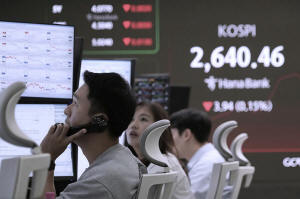World shares are mixed and US futures jump ahead of Wall St reopening
from holiday
[May 27, 2025] By
ELAINE KURTENBACH
European shares advanced Tuesday after a mixed and quiet session in Asia
following the Memorial Day holiday in the U.S.
U.S. futures and European shares have gained after U.S. President Donald
Trump said he would delay a threatened 50% tarif f on goods from the
European Union.
The EU’s chief trade negotiator said Monday he had “good calls” with
Trump administration officials and that the bloc was “fully committed”
to reaching a trade deal by a July 9 deadline. Last week, Trump had said
on social media that trade talks with the European Union “were going
nowhere” and that “straight 50%” tariffs could go into effect on June 1.
The future for the S&P 500 was up 1.5% while that for the Dow Jones
Industrial Average gained 1.3%.
Data on U.S. consumer confidence and housing prices were due later in
the day.
In London, the FTSE 100 gained 1.1% to 8,818.08, reopening after a
British holiday on Monday.
Germany's DAX added 0.7% to 24,205.92, while the CAC 40 in Paris picked
up 0.3% to 7,850.31.
In Asian trading, Japan's Nikkei 225 reversed early losses to gain 0.5%,
closing at 37,724.11 after the central bank's said he anticipates
raising interest rates in coming months due to inflationary pressures.

Bank of Japan Gov. Kazuo Ueda cited rising food prices, with rice prices
doubling in the past year, as one factor. Inflation in Japan is now
higher than in the U.S. or Europe and above the BOJ's target level of
about 2%.
But the central bank also has to take into account trade policies, he
said without directly mentioning Trump's tariff hikes. Risks from
uncertainty for the global economy complicate the BOJ's goal of raising
its very low benchmark interest rate of 0.5%, Ueda said in a speech
Tuesday.
“We are now closer to the target than at any time during the last three
decades, though we are not quite there. Our recent path has been
affected in a unique way by supply shocks,” Ueda said.
[to top of second column] |

A currency trader talks on the phone near a screen showing the Korea
Composite Stock Price Index (KOSPI) at the foreign exchange dealing
room of the KEB Hana Bank headquarters in Seoul, South Korea,
Tuesday, May 27, 2025. (AP Photo/Ahn Young-joon)
 Hong Kong's Hang Seng gained 0.4% to
23,381.99, while the Shanghai Composite index shed 0.2% to 3,340.69.
In South Korea, the Kospi lost 0.3% to 2,637.22.
Australia's S&P/ASX 200 climbed 0.6% to 8,407.60 and Taiwan's Taiex
lost 0.9%. In India, the Sensex fell 1.2%.
In other dealings early Tuesday, U.S. benchmark crude oil was
unchanged at $61.53 per barrel. Brent crude, the international
standard, picked up 6 cents to $64.18 per barrel.
The U.S. dollar rose to 143.87 Japanese yen from 142.85 yen. The
euro fell to $1.1358 from $1.1388.
The impact on markets from Trump’s decision to delay the threatened
50% tariff on imports from the European Union was relatively calm as
investors are growing inured to such policy changes, Stephen Innes
of SPI Asset Management said in a commentary.
“Investors know this act by heart,” Innes wrote. “The volatility is
still there, but like a horror franchise on its fifth sequel, the
jump scares are losing their bite. Panic-selling into a Trump
pirouette doesn’t pay like it used to — markets have seen this dance
before.”
On Friday, U.S. stocks fell as traders weighed whether Trump’s
latest threats were just negotiating tactics.
The S&P 500 lost 0.7% to end its worst week in the last seven. The
Dow dropped 0.6% and the Nasdaq composite sank 1%.
All contents © copyright 2025 Associated Press. All rights reserved
 |